Following the season, the New Jersey Devils of the NHL drafted Modry 179th overall in the middle of the ninth round, a testament to the timing of his birth, as Czechoslovak hockey players were now being allowed to leave for the NHL without having to defect from behind the Iron Curtain any longer.
For the 1990-91 season Modry would join HC Dukla Trencin, scoring a goal and 9 assists in 33 games. He also would make his only international appearance for Czechoslovakia at the 1991 World Junior Championship, earning a bronze medal.
In 1991-92, Modry would split the season between Dukla Trencin with 18 games in the First Ice Hockey League and 14 games withh his original club, Ceske Budejovice, who by then had been relegated to the Czech second division. Modry would tally 4 goals and 14 points as Budejovice would win the Second Ice Hockey League championship to earn a promotion back to the First League.
Also drafted the same year as Modry was Petr Nedved (2nd overall), who had defected in January of 1989, and Jaromir Jagr (fifth overall), who was not only allowed to leave, but was present for the draft itself. In all, 22 Czechoslovakians were drafted that year, including Jiri Slegr, Richard Smehlik, Roman Turek, Robert Lang and Peter Bondra.
With the path to North America now open, the now 21 year old Modry came to North America for the 1992-93 season and was assigned by the Devils to their AHL Utica Devils affiliate. No longer required to be a defensive specialist, Modry immediately blew away all his previous offensive numbers with a 7 goal, 42 points season, thanks in part to the AHL's 80 game schedule, double what he was used to playing in Europe.
The Devils affiliate relocated to become the Albany River Rats for the 1993-94 season, where Modry played 18 games as well as making his NHL debut with New Jersey, with whom he saw action in 41 games.
The start of the 1994-95 NHL season was delayed due to labor issues, so Modry returned to HC Ceske Budejovice (which was now a part of the Czech Republic) for 19 games until the NHL season resumed. Back in North America, he played 18 games with Albany and 11 for New Jersey in the NHL. He was back in Albany in time for the playoffs, where he contributed 3 goals and 6 points in 14 games as the River Rats would claim the Calder Trophy as AHL champions.
Unable to crack the NHL Devils lineup, who went on to win the 1995 Stanley Cup, Modry was dealt to the Ottawa Senators for the 1995-96 season. He played 64 total games for the Senators, but would finish the season with 9 games for the Los Angeles Kings following a trade in late March.
It would take Modry five seasons to establish himself as a Kings regular, as 1996-97 was divided between the Kings (30 games), the Phoenix Roadrunners (23 games) and the Utah Grizzlies (11 games), both of the latter being in the IHL. 1997-98 was spent entirely with the Grizzlies, with whom he would seta new career high with 12 goals on his way to a 33 points season.
1998-99 was spent almost entirely with the Long Beach Ice Dogs of the IHL, seeing action in 64 games, although he was recalled by the Kings for the first time in two seasons with 5 games. His playing time was limited in 1999-00 to just 37 games, but the majority of those, 26, were with Los Angeles in the NHL.
Finally in 2000-01, Modry spent an entire season in the Kings, scoring 19 points in 63 games. He then set an NHL career high in 2001-02 with 42 points from 4 goals and 38 assists. He fine season was recognized when he was named to the 2002 NHL All-Star Game.
He then backed up his previous season with a 38 point campaign in 2002-03 when he set a career high by playing in all 82 games for the only time in his career. Following the season, Modry would appear in his only World Championships, playing in 9 games, this time for the Czech Republic. A third strong season followed in 2003-04 with 79 games played and 32 points.
Modry would return to what was now the Czech Republic in 2004-05 when the NHL season was cancelled, suiting up for 19 regular season games for HC Liberec and 12 more playoffs games.
He returned to the NHL for the 2005-06 season, only now as a member of the Atlanta Thrashers, where he picked up where he left off with 79 games played and 38 points to lead all Thrashers defensemen. Despite his fine season in Atlanta, Modry was dealt to the Dallas Stars for the 2006-07 season, but after 57 games Modry would find himself back in familiar territory, as the Stars would include him in a deal which sent him to the Kings for a second tour of duty.
After finishing the season with 19 games for the Kings, Modry would play 61 games of the 2007-08 season before another trade would see him finish out his NHL career with 19 games with the Philadelphia Flyers.
Modry then returned to the Czech Republic for the final phase of his career, rejoining HC Liberec as team captain for 2008-09 before joining HC Plzen 1929, with whom he played the final three seasons of his career before retiring after the 2011-12 season.
His final NHL totals were 725 games played, 49 goals and 201 assists for 250 points.
Today's featured jersey is a 2001-02 Los Angeles Kings Jarslav Modry jersey worn during the season he set a career bests with 38 assists and 42 points.
This jersey features the 2002 NHL s-Star Game patch, as the Kings hosted the All-Star Game that season, as well as the AM memorial patch for Garnet "Ace" Bailey and Mark Bavis, scouts for the Kings were were killed when United Airlines flight 175 was flown into the World Trade Center on September 11th just prior to the start of the 2001-02 season.
This style of jersey was the Kings alternate jersey for three seasons, first introduced in 1999-00 to compliment their home white and road black jersey. From 2002 onward, the club swapped the coat of arms and crown logos on all their jerseys, making the original purple alternate with the crown logo the scarcer of the two versions, as the coat of arms crested purple alt would remain in use for five seasons compared to the three for the crown version.
Bonus jersey: Today's bonus jersey is a 2005-06 Atlanta Thrashers Jaroslav Modry jersey as worn when Modry returned from Europe when NHL play resumed after the lost season of 2004-05.
The Thrashers wore this style from their debut in 1999-00 through the change to Reebok Edge jerseys for 2007-08, seven seasons in all, not counting the lost season of 2004-05.

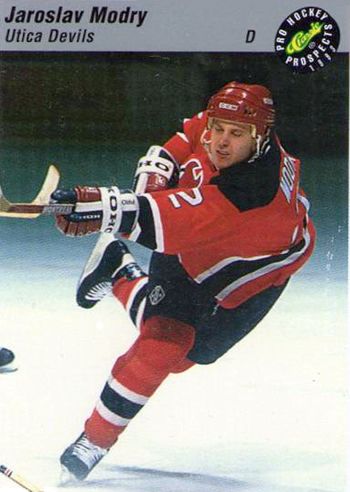
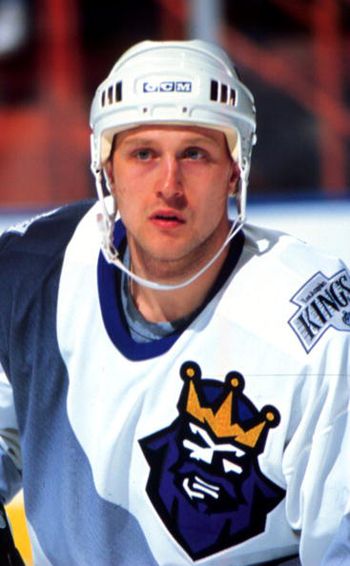
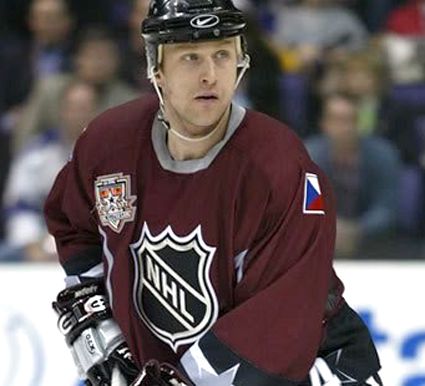
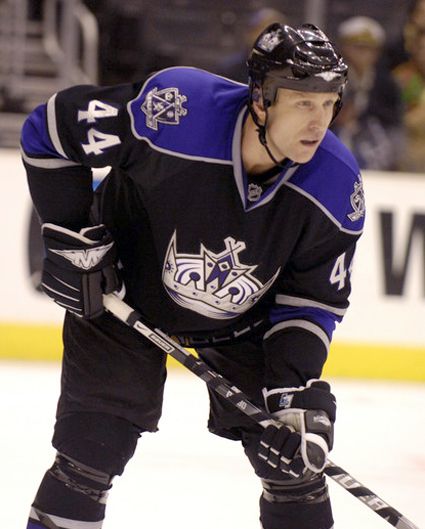
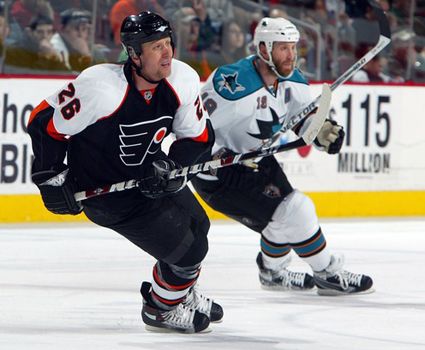
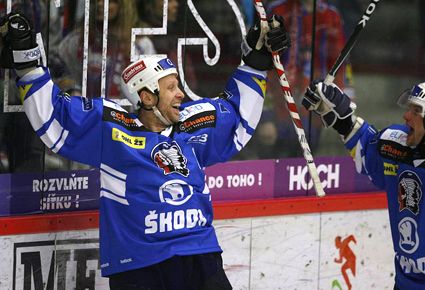
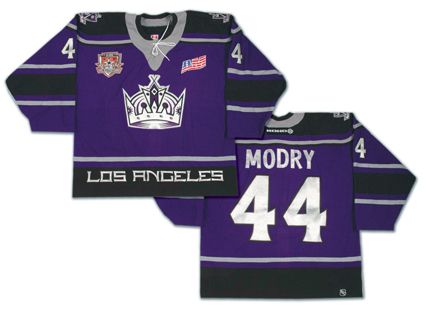
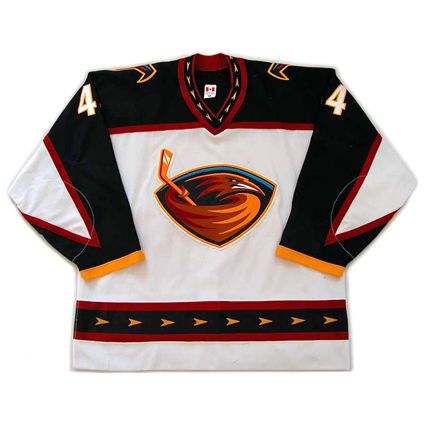
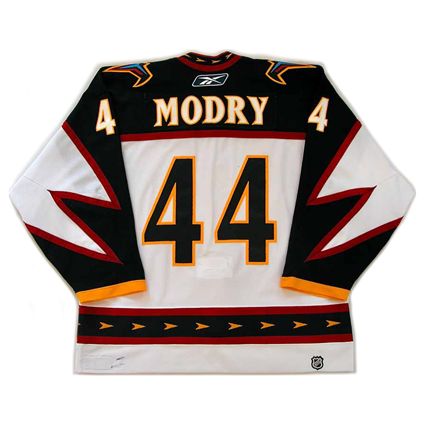










No comments:
Post a Comment
We welcome and encourage genuine comments and corrections from our readers. Please no spam. It will not be approved and never seen.